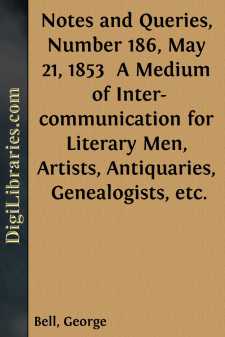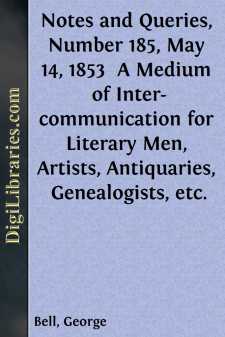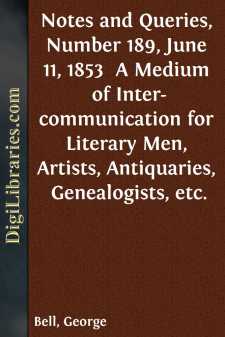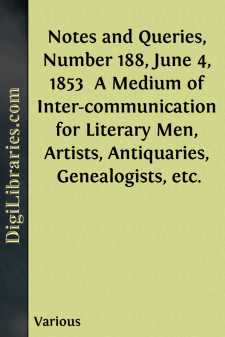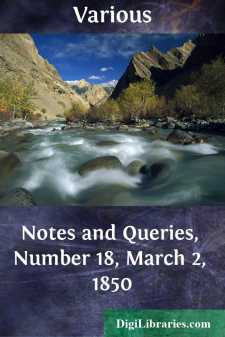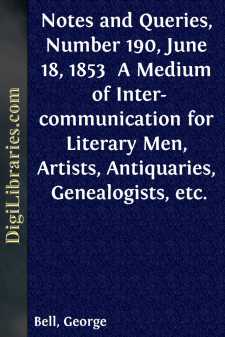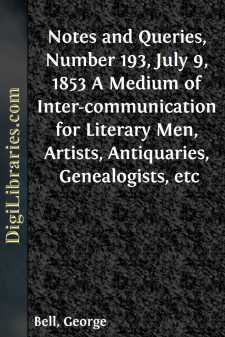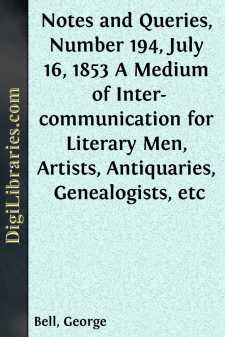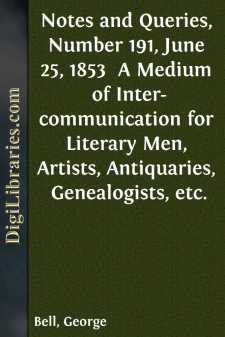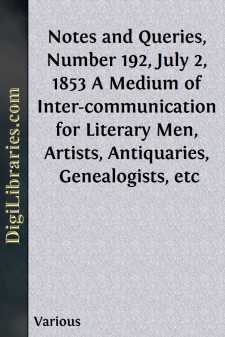Periodicals
- Art 27
- Children's periodicals 59
- Entertainment 5
- Food/Wine 2
- Games/Humor 455
- General
- Health 1
- History 53
- House/Home 1
- Regional 62
- Science/Nature 118
- Transportation 10
General Books
Sort by:
by:
George Bell
LORD BACON'S "ADVANCEMENT OF LEARNING." Considering the large number of quotations from previous writers which occur in Lord Bacon's works, and especially in his most popular and generally read works—his Essays and his Advancement of Learning—it is remarkable how little his editors have done for the illustration of his text in this respect. The French editors of Montaigne's...
more...
by:
George Bell
ENGLISH BOOKS OF EMBLEMS. It is a remarkable circumstance that whilst the emblems of Alciatus Vent through almost innumerable editions, and were translated into most of the continental languages, no version of these Emblems should ever have been printed in this country, although we believe that MS. translations of them are in existence. It is remarkable also that more than half century should have...
more...
by:
George Bell
TOM MOORE'S FIRST! It is now generally understood that the first poetic effusion of Thomas Moore was entrusted to a publication entitled Anthologia Hibernica, which held its monthly existence from Jan. 1793 to December 1794, and is now a repertorium of the spirited efforts made in Ireland in that day to establish periodical literature. The set is complete in four volumes: and being anxious to see...
more...
by:
Various
NOTES ON SEVERAL MISUNDERSTOOD WORDS. (Continued from p. 522.) Dare, to lurk, or cause to lurk; used both transitively and intransitively. Apparently the root of dark and dearn. "Here, quod he, it ought ynough suffice, Five houres for to slepe upon a night: But it were for an olde appalled wight, As ben thise wedded men, that lie and dare, As in a fourme sitteth a wery hare." Tyrwhitt's...
more...
by:
Various
NOTES UNPUBLISHED LETTER OF HORACE WALPOLE I have the pleasure of inclosing to you (I believe) an unpublished letter of Horace Walpole's. It was found among the papers of the late William Parsons, one of the Della Cruscan poets. That it is genuine I have no doubt. The handwriting is precisely similar to a note sent with a copy of the Mysterious Mother to Mr. Parsons, in which Horace Walpole...
more...
by:
George Bell
ON THE USE OF THE HOUR-GLASS IN PULPITS. George Herbert says: "The parson exceeds not an hour in preaching, because all ages have thought that a competency."—A Priest to the Temple, p. 28. Ferrarius, De Ritu Concion., lib. i. c. 34., makes the following statement: "Huic igitur certo ac communi malo (the evil of too long sermons) ut medicinam facerent, Ecclesiæ patres in concionando...
more...
by:
George Bell
THE EYE: ITS PRIMARY IDEA. I do not remember to have remarked that any writer notices how uniformly, in almost all languages, the same primary idea has been attached to the eye. This universal consent is the more remarkable, inasmuch as the connexion in question, though of course most appropriate and significant in itself, hardly seems to indicate the most prominent characteristic, or what we should...
more...
by:
George Bell
DERIVATION OF THE WORD "ISLAND." Lexicographers from time to time have handed down to us, and proposed for our choice, two derivations of our English word Island; and, that one of these two is correct, has, I believe, never yet been called in question. The first which they offer, and that most usually accepted as the true one, is the A.-S. Ealand, Ealond, Igland; Belg. Eylandt: the first...
more...
by:
George Bell
WITCHCRAFT IN SOMERSETSHIRE. Perhaps the following account of superstitions now entertained in some parts of Somersetshire, will be interesting to the inquirers into the history of witchcraft. I was lately informed by a member of my congregation that two children living near his house were bewitched. I made inquiries into the matter, and found that witchcraft is by far less uncommon than I had...
more...
by:
Various
OBLATION OF A WHITE BULL. By lease dated 28th April, 1533, the Abbat of St. Edmund's Bury demised to John Wright, glazier, and John Anable, pewterer, of Bury, the manor of Haberdon appurtenant to the office of Sacrist in that monastery, with four acres in the Vynefeld, for twenty years, at the rent of 5l. 4s. to the Sacrist; the tenants also to find a white bull every year of their term, as often...
more...


